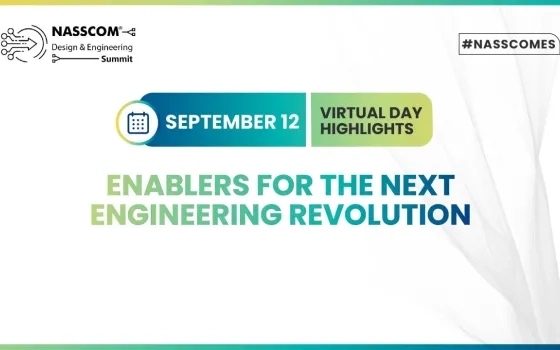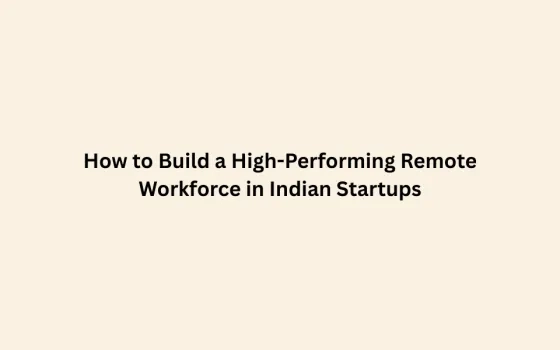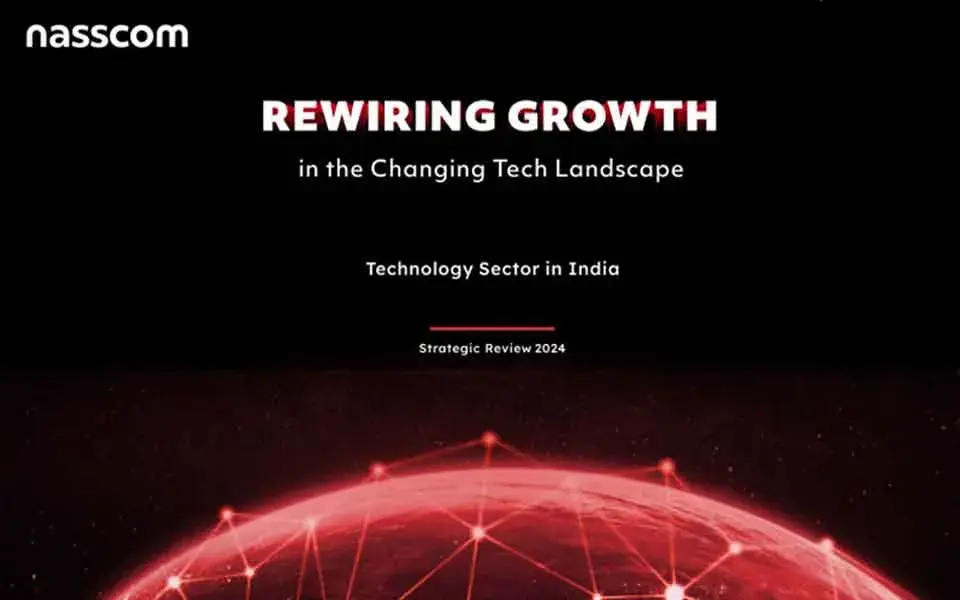With the theme of ‘Designing a Sustainable, Connected Future’, the 14th NASSCOM Design & Engineering Summit celebrated the success of the global engineering & design ecosystem. This two-day hybrid summit focused on sustainability, innovation, hyperconnectivity and the future of engineering.
Here, we have gathered insights & takeaways from our sessions on ‘Enablers for the Next Engineering Revolution’ held on September 12, 2022.
Morning Episodes
The day began with a keynote by Krishnan Ramanujam, Chairman, NASSCOM & President, Enterprise Growth Business, Tata Consultancy Services, sharing the NASSCOM Perspective on ER&D. He talked about how we are living in a hyper-connected world where disruptive innovation is the norm, and focusing on building sustainable products is a priority for all organisations. He further added how our Prime Minister, in his address on the occasion of our 75th year of independence, invited us all to make this ‘India's Techade’ - a decade where technology will redefine India across multiple parameters of inclusion, innovation, and impact.
We then had Karthikeyan Natarajan, Chair, NASSCOM ER&D Council & Executive Director & COO, Cyient, who shared “the problems all of us need to tackle are about growth, climate change, and talent”, quoting McKinsey & Company CEO, Bob Sternfels that it is not just India's decade but India’s century. He believes that this is a great time to be at the forefront of technological innovation as we take on the challenge of designing a sustainable, connected future. With 520 of the top 1000 R&D spenders from India, he believes that this is a turning point for India to take charge and define the future of technology innovation.
Next, we had an insightful keynote session with Steven Hall, President (EMEA), ISG (Information Services Group), on Powering a Hyperconnected World: Next Generation of Engineering. He shared insights into what the world will look like in 2030, how engineering spending is on a meteoric rise and how the pandemic has accelerated the evolution of engineering. He emphasized on the importance of designing for experiences rather than services.
Following this, we had Josh Giegel, Co-founder of Virgin Hyperloop talk about Imagining a Hyperconnected World with Loop Technology. He spoke about the upcoming trends in the global hyperloop technology industry and the power of engineering to enable sustainable transportation, opportunities in India and the future. He highlighted several unique transportation challenges faced in India and the opportunities that come with them. He also shared his perspective on India’s energy management, how India is spending hard-earned wealth on acquiring energy and the opportunity to domestically produce energy with an example of how manufacturing equipment to capture solar energy can not only help economic development, but also create jobs!
Next, we had a fireside chat with Dinesh Ramanathan, Co-founder & Co-CEO, NexGen Power Systems and Sindhu Gangadharan, SVP and Managing Director, SAP Labs India on Creating Business Impact with Industry X.0. Dinesh talked about the new kinds of disruptions and opportunities facing the industry today and how the new industrial revolution can help businesses thrive in the longer run. He believes manufacturing is going to be one of the key focuses of the industry. Businesses will need to relook at how they receive their customers, react to their requirements and the methods they use to enable steady & faster adoption of tech.
In a fireside chat with some brilliant takeaways discussing Cutting Edge Innovation from India for the World, we had Rajesh Jejurikar, Executive Director, Auto, and Farm Sectors, Mahindra Group and Karthikeyan Natarajan, Executive Director & COO, Cyient. According to the Mahindra Group leader, a very important part of tech & innovation is having clarity around segments one wants to address so that innovation is relevant to needs, expectations & aspirations of the target. He believes that when a product can fit the sweet spot with the right offering, the right technology, and relevant innovation, customers will accept and even wait. He emphasized how technology, price, design and style need to all come together very neatly to create interesting propositions for customers.
For the next fireside chat on Integration of Hardware and Software Designs: Redefining the Benchmarks, we were joined by Magnus Östberg, Chief Software Officer, Mercedes-Benz AG and Nivruti Rai, Country Head, Intel India, VP, Intel Foundry Services, Intel Corporation. Magnus talked about improving productivity while reducing operational costs, and how EVs are not just about the batteries, but also the design of the vehicle, the drag coefficient, and the electric motors. He also emphasized how connectivity plays an important role in designing a premium experience. Nivruti added that according to her, cars of tomorrow will not just be transportation devices, but will be spas, entertainment devices or more, enabled by connectivity & intelligence.
We then had Shankar Subramaniam, Founder & CEO, SAVEMED talking to Sandeep Bahl, Vice President, Konnect, NASSCOM at our Innovation Corner, a segment where we brought stories of people who are changing lives and solving problems using technology. Innovation does not always need huge investments and lots of experience. Shankar Subramaniam, a grade twelve student from Bangalore created an app to collect unused medicines and donate them to the underprivileged, leveraging mobile technology and enabling centralized crowdsourcing for the donation of unused medicines. According to Shankar, the simplest things can go a long way. He believes that solutions are usually right under our noses, we just have to look harder. Sharing his experience, he stressed on the importance of exploring as one might come across a brilliant idea that could change the world for the better.
For an exciting fireside chat on Data-Driven Manufacturing: Building a Connected Value Chain, we had Ken Kleinhample, Vice President, Global Product Organization (GPO) & Product Development Excellence (PDx), Whirlpool Corporation and Jayasimha Chalasani, VP & Business Head, Integrated Engineering Solutions, Tech Mahindra. Ken emphasized on how today's businesses need to be extremely agile, thus, working with one plan is not an option. With the advancements in analytics and the ability to be able to understand the current situation, businesses can up their manufacturing game.
We then had the ‘Father of the Pentium Chip’, Vinod Dham, Founding Partner, NewPath Venture, Co-Founder & President, AlphaICs with a keynote on Catalyzing Semi-Con Ecosystem. He spoke about the way forward for India to become the next best destination for semiconductor manufacturing and how the rapidly growing ‘Digital India’ with its ~2 billion mobile subscribers will increasingly demand smartphones requiring advanced communication services, cloud computing, and servers. He also stated that domestic electronics production is slated to increase 5x over the next five years and that the worldwide semiconductor industry is going through explosive growth.
Next up, we were joined by François Dossa, Executive Director, Strategy and Sustainability, @Jaguar Land Rover and Kishor Patil, Co-founder, Managing Director, and CEO, KPIT for a fireside chat on Sustainable Mobility for a Better Tomorrow: From Theory to Practice. Francois shared that sustainability is not only about emissions, it's the entire journey from the design of the cars, the way cars are engineered, their manufacturing, and even the way cars are sold. He also emphasized on adoption of a circular economy for the automobile industry and the challenges associated with it.
In the next fireside chat session with Lars Stenqvist, EVP & CTO - Group Trucks Technology, Volvo Group and Sukamal Banerjee, Corporate Vice President, ERS and IoT WoRKS™, HCL Technologies, the leaders spoke about R&D Fueled Digital Innovation. Lars touched upon the move towards fossil-free transportation, the role of next-gen tech to create customer-centric solutions, the advent of autonomous vehicles, and the impact on sustainability goals. According to him, sustainability in transport is going fossil-free. He spoke about how the Volvo Group is talking about 100% fossil-free solutions from 2040 onwards, implying that a company that has been relying on fossil fuel and combustion engines for almost 100 years, will in less than 20 years turn it upside down. Lars called it a huge transformation which they are aiming for - a challenging, yet inspiring transformation for all engineers across the industry.
For the last session of the morning episode, we were joined by Dr. Mallik Tatipamula, CTO, Ericsson, Silicon Valley, Shyam Prabhakar Mardikar, President | Group CTO Mobility, Reliance Jio and Supria Dhanda, Executive Board Member, ABS INDIA PVT LTD talking about 5G and Cloud: Creating New Opportunities for Digital Enterprises. Supria shared that with 5G networks, we're all reimagining the design of new business network infrastructure and that there’s a promise of huge computational power being unleashed. Adding to this, Shyam shared that 5G brings about very fundamental & paradigm shifts paving the way for a total & complete digital transformation - 5G is not connectivity only, there is ability to compute & store. Dr. Malik further added that offloading compute from central data centers & from devices to network edges is driving network compute fabric, which has transformed 5G networks from pure connectivity to innovation platforms.
Afternoon Episodes
The afternoon episode began with a fireside chat with Jahidul Khandaker, SVP & CIO, Western Digital and Rama Vedashree, CEO, Data Security Council of India on Trust in Networks: Cybersecurity and Data Protection in 2025. Rama kickstarted the session and shared that there's been a massive infusion of digital tech & many enterprises moved aggressively to the cloud. Along with mainstreaming of the cloud, there's attention to zero trust network architecture. Adding to this, Jahidul shared that the new challenges that present themselves with hyperconnectivity require a new security paradigm, making it necessary to reassess the current policies and security framework.
For the second Innovation Corner, we were joined by young innovator, Kautilya Katariya, from Kautilya Concepts - Python, DSA, Algorithms, who shared his journey of becoming the ‘Youngest Computer Programmer’ at the age of 6 and holding a Guinness record for same. Now 8 years old, he is an IBM Artificial Intelligence (AI) professional and a certificated Microsoft Technology Associate. According to the young achiever, it’s important to keep learning and exploring your interests. Sharing insights beyond his age, he told the audience to do what you love and love what you do, take a break when you need it and make sure you play outside a lot.
Post this, we had Jonathan Woetzel, Director, and Senior Partner, McKinsey Global Institute, Shanghai talking about Future City & Net Zero Carbon. He spoke about how engineering and design can cater to net zero goals and what the implications of policy decisions like BSVI and phasing out of ICE vehicles will be. He stated that many cities worldwide are working towards net zero status and believes that we can't simply rely on either markets, countries or multilaterals, as we all will have to play a role. Cities will need to be redesigned physically in terms of mobility, energy, infrastructure, food systems and more to achieve these goals.
For the last session of the afternoon episode, we were joined by Sheila Jordan, Senior Vice President, Chief Digital Technology Officer, Honeywell and K S Viswanathan Ksv, Vice President, Industry Initiatives, NASSCOM on Getting the Digital Transformation Right. Sheila talked about Honeywell's digital transformation journey so far, the role of leadership in redefining business processes, culture, and employee and customer experiences, and how digital transformation is enabling innovation. Commenting on the process of transformation she shared, “Firstly, set the team. Then, it's a function of prioritization. You then have to get the right tech & platform & drive standardisation. Finally, paint the vision - that's what gets everyone excited.”
For an exciting session on Next-Gen Mobility: Software Defined Vehicles, we were joined by Sachin Lawande, President & CEO, Visteon India and Reguraman Ayyaswamy, Senior Vice President, IoT and Digital Engineering, Tata Consultancy Services. Talking about the rapid transformation in the automotive industry, Regu shared that traditionally, many features brought by automotive companies were through improvements and additions to hardware. Today, software plays a permanent & central role in vehicle features & CX. Adding to the conversation, Sachin spoke about software as the driving force for vehicles today and the effects of the semiconductor crisis as vehicles become increasingly software-driven. He further talked about how this is an interesting transformation that is happening in the entire automotive industry and technologies like big data, cloud, edge will make driving more convenient, safer, and accessible.
For the next session, Evolution of Satellite-Based Services we were joined by Pradeep Kaul, President, and CEO, Hughes Systique Corporation (HSC) and Sidhant Rastogi, Managing Partner & Global Head, Zinnov. Sharing his views on recent changes in satellite architecture, Pradeep shared that from geo-stationary, there is a transition to low-orbiting (LEO) satellites. This is because delay in LEO dramatically drops and the power required to bounce signals off of a LEO is much less. Sidhant summed up the explanations by sharing that the billions of dollars being spent on fibre optic cables can be supplanted with constellations of LEO satellites, giving the same level of service, even to the most rural of places.
For the session on Future of Transportation: Where will it go?, we were joined by Jean-Francois Beaudoin, President of Digital & Integrated Systems, Alstom and Savyasachi Srinivas, Executive Director, Collins Aerospace. Talking about the parallels between digital changes taking place in the rail and aviation industry, Savyasachi mentioned bringing intelligence on board that focuses on autonomy and passenger experience, right from the check-in at airports to connectivity in-flight. Jean-Francois spoke about digital mobility and the latest trends in signaling and automation, developing alternative energy sources and innovations contributing to sustainability and efficiency. He spoke of how digitalization is a key enabler for getting more input on existing railway infrastructure.
The last session of the day, Innovation and Purpose at the Heart of Leadership saw Kiran Mazumdar Shaw, Executive Chairperson, Biocon, and Biocon Biologics share her thoughts. She spoke about how leaders need to realign their strategies for fostering innovative solutions with technology at the forefront. She believes that if we make the right decisions, the future for a sustainable planet will be bright and promising. For designing a sustainable and connected future, technology and scientific innovation will need to address burning issues that can make or break humanity such as hunger, poverty, health care, economic equity, clean air and water, biodiversity, education, world peace, and of course, environmental protection.
The virtual session day of the 14th edition of NASSCOM Design and Engineering Summit saw active participation from all stakeholders of the engineering ecosystem. Leaders discussed some of the greatest challenges and opportunities around sustainability and transformation and shared key insights for the same.
September 12 & 14, 2022
https://nasscom.in/engineeringsummit
















